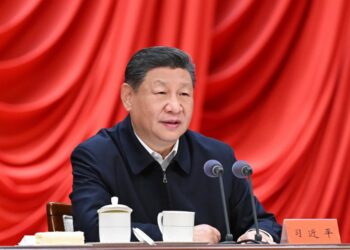From Jules Verne to three-bodies problem, Sino-French exchanges in science fiction are constantly increasing.
The giant puppet of a world tour of the world in eighty days scrolls in Hong Kong on December 1, 2024.
Science fiction (SF), a literary genre that links the present to the future, science to imagination, plays a crucial role in exchanges between civilizations. The exchanges in terms of SF between China and France, extending over three centuries, illustrate in a living way the creative fusion and mutual learning between the two cultures. Names like Jules Verne, Camille Flammarion, Lu Xun, Liang Qichao, Liu Cixin and Han Song retrace the journey of these exchanges, which went through three periods: the complete transfer of French SF at the end of the 19th century, a selective absorption of the French SF in the 20th century and an equal dialogue between the two parts in the century.
The “JULES VERNE” fever “at the end of the Qing and the birth of the Chinese SF
SF’s novel was introduced in China at the end of the Qing dynasty, with the movement of “dissemination of Western knowledge to the east” (XIXUE Dongjian). In 1872, the Shenbao newspaper published the translation of Rip Van Winkle by Washington Irving, marking the first appearance of the genre in China. In 1891, with the introduction of Looking Backward: 2000-1887 by Edward Bellamy, the Chinese literary world experienced a wave of translation of Western SF works. The translations during this period were mainly influenced by the “JULES VERNE fever” in Japan during the Meiji era (1868-1912), quickly making Jules Verne the most famous SF author at the end of the Qing.
In 1900, the Chinese version of the World Tour in eighty days, translated by Xue Shaohui and Chen Shoupeng, was published, becoming the first translation of the works of Jules Verne in China. In the following decade, several great writers and translators, including Lu Xun, Liang Qichao and Bao Tianxiao, translated more than a dozen novels by Jules Verne, including a captain of fifteen years (1901), twenty thousand leagues under the seas (1902) and travel to the center of the Earth (1903). Between 1896 and 1916, the number of translations of works by Jules Verne was in third row among those of foreign writers in China, just behind the detective novels of Conan Doyle and the adventure novels of Henry Rider Haggard. Translators at the time favored domestication to make the text more accessible to Chinese readers.
The role of the works of Jules Verne in China varies according to the times. In his Chinese translation of the Roman de la Terre à la Moon (1903), Lu Xun underlined the role of initiation of the SF novel to “guide the Chinese people towards Progress” and treated the works of Jules Verne with “scientific novels”. This point of view made Jules Verne a source of initiation to science and his works were considered by intellectuals at the end of Qing as a cultural weapon to make ignorance back and cultivate national feeling.
The so -called “scientific adventure” style of Jules Verne directly influenced the first works of Chinese SF. In 1904, the novel colonization of the Moon, published in soap opera in the Revue Xiuxiang Xiaoshuo, marked the beginning of the Chinese SF. Balloon flight, lunar exploration and interstellar colonization, present in the novel, draw their inspiration from the imagination of Jules Verne. Subsequently, works such as new stone tale (1905) and future air war (1908) were published, constituting the first wave of Creation of Chinese SF. Most of these works appeared in the most popular journals of the time, including XIUXIAG XIAOSHUO and YUEYUE XIAOSHUO. We find it directly there the model of “scientific reasoning” of the French SF, which combines science and imagination.
This “Fever Jules Verne” continued during the Republic of China (1912-1949). After the foundation of New China, the new translations of Zheng Kelu and Yang Xianyi, among others, gave new breath to the works of Jules Verne. Even today, Jules Verne remains champion of translations in China in terms of history, quantity and influence. Its image in China has evolved over time, first initiator, then SF writer, then author of children’s literature, and today classical author. His works inspired Chinese SF writers from generation to generation. We can even say that without Jules Verne, there would have been no Chinese SF. Sino-French exchanges in SF opened a new chapter in 2016, where the French version of the three-bodies from Liu Cixin was unprecedented.

Three children discover an immersive area of experience on the theme of the three -bodies problem in Beijing, on February 20, 2021.
Translation and dissemination of the three -bodies problem in France
In 2015, the English version of the three -body problem won the 73rd Hugo Prize for best novel, marking the entry of Chinese SF literature on the world scene. The world, in the article Liu Cixin, the first of its kind dated November 9, 2016, praised this Chinese writer for having paved the way for a revival of the Chinese SF, more sophisticated and subversive, calling it “Chinese Verne”. This appreciation announced the possibility of a sino-French literary dialogue in the SF.
The year 2016 is a key turning point for the broadcast of the Chinese SF in France. That year, the first volume of the three-body problem trilogy, translated by Gwennaël Gaffric, a sinologist at Lyon III University, was published by Actes Sud. This translation, recognized for its remarkable loyalty to the original work, was well received by the university environment. Subsequently, Actes Sud continued the publication of the following two volumes: La Forêt Dark (2017) and Immortelle Death (2018). Other works by Liu Cixin, such as lightning ball, the wandering earth and the era of the supernova, have also emerged in France. In March 2025, on the occasion of the 10th anniversary of the Hugo Prize awarded to the three -body problem, an agreement on the sale of the rights of the graphic novel in French version of the book was signed at the International London Book Fair.
The trilogy of the three -bodies problem remained at the top of SF sales for a long period in France. Its success lies in the unique form of dialogue between civilizations that Liu Cixin built in his writings: in the three -body game, ancient Chinese wise men like King Wen of the Zhou and Mo Zi dialogue with Western scientists like Newton and John von Neumann, transcending time and space; The vast human computer cleverly combines the military organization of the Qin dynasty with the binary logic of computer science; In the third volume, Yun Tianming tales compare the cavalier perspective of Chinese painting with the linear perspective of Western painting. Liu Cixin presents the Chinese cultural landscape as part of cosmos civilizations. “It almost perfectly integrates the 5,000 years of Chinese history with the 15 billion years of cosmic history, creating a poetic link between the microscopic and the macroscopic,” said Han Song, Chinese writer of SF. Through concepts such as the “dark forest”, the three -bodies problem engages a philosophical dialogue between the idea from Daodejing according to which “heaven and earth have no particular affection” and the state of nature of Thomas Hobbes, manifesting a concern for the survival of civilizations.

On the theme “Science fiction creates a better future”, the Conference on Science Fiction of China 2025 opens its doors to the Shougang Park, March 28, 2025.
A new perspective
In addition to Liu Cixin, other writers of the new wave of Chinese SF also draw the attention of the French academic and editorial environment. In 2016, Hao Jingfang, born in the 1980s, received the Hugo Prize for best news for her short story Folding Beijing. The following year, the French version was published by Acts Sud. Han Song’s works have been systematically translated by Loïc Aloisio, professor at the University of Aix-Marseille. The post-humanism of Chen Qiufan and the style of “soft science fiction” of Xia Jia were presented in the semi-annual Jentayu journal.
These writers try to present on the world scene works of the SF keeping Chinese culture and spirit, this is the reason why the Chinese SF is well received in France.
In the publishing field, a translation system coordinated by specialized publishing houses and academic journals has been established; In terms of research, an academic mechanism promoting the practice and the theory of translation has been put in place; In terms of writing, innovations fueled by intercultural imagination have emerged.
These exchanges enrich world SF and promote mutual learning between civilizations, constituting a deep dialogue between scientific rationality and humanist spirit. Initiated by the SF, these exchanges now go beyond literature to become a spiritual resource that invites you to think together with the fate of humanity.
*Wu Shijueshan is a lecturer at the Foreign Foreign Languages of the Normal University of the Capital, Doctor of Comparative Literature by Sorbonne University, and science fictional researcher.








